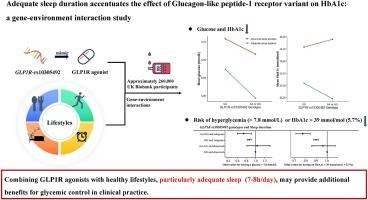Adequate sleep duration accentuates the effect of glucagon-like peptide-1 receptor variant on HbA1c: A gene-environment interaction study
IF 6.1
3区 医学
Q1 ENDOCRINOLOGY & METABOLISM
引用次数: 0
Abstract
Background
Both glucagon-like peptide-1 receptor (GLP1R) agonists and lifestyle modifications are widely adopted in managing glycemia. However, the joint effects of GLP1R agonists with lifestyle on glycemic traits have not been evaluated.
Methods
This gene-environment study tested the interaction between GLP1R-rs10305492 variant, consistent with the effect of GLP1R agonist therapies, and four lifestyle factors (diet, physical activity, sleep duration, and chronotype) for glucose and glycated hemoglobin (HbA1c) levels among 263,846 UK Biobank participants. Linear regression models were conducted to evaluate the effects of the rs10305492 and lifestyle factors on glucose and HbA1c levels.
Results
GLP1R-rs10305492-AA/AG genotype combined a healthy diet, regular physical activity, adequate sleep duration, or morning chronotype were associated with lower glucose and HbA1c levels (all P for trend < 0.001). A synergistic effect was found between rs10305492 and sleep duration on HbA1c, suggesting a recommended adequate sleep duration (7–8 h/day) may amplify the HbA1c lowering effect of GLP1R agonists. Joint effects of the rs10305492 and adequate sleep were associated with a 26 % reduced risk of hyperglycemia (>7.8 mmol/L) risk and a 22 % lower of high HbA1c (>39 mmol/mol or 5.7 %).
Conclusions
Combining GLP1R agonists with adequate sleep may provide additional benefits for glycemic control in clinical practice.

充足的睡眠时间可加强胰高血糖素样肽-1 受体变异对 HbA1c 的影响:一项基因与环境相互作用的研究。
背景:胰高血糖素样肽-1受体(GLP1R)激动剂和生活方式的改变都被广泛用于控制血糖。然而,GLP1R 激动剂与生活方式对血糖特征的共同影响尚未得到评估:这项基因环境研究测试了与 GLP1R 激动剂疗法效果一致的 GLP1R-rs10305492 变体与四种生活方式因素(饮食、体力活动、睡眠时间和慢性型)之间的相互作用,这些因素对 263846 名英国生物库参与者的血糖和糖化血红蛋白(HbA1c)水平的影响。通过线性回归模型评估了 rs10305492 和生活方式因素对血糖和 HbA1c 水平的影响:结果:GLP1R-rs10305492-AA/AG基因型与健康饮食、有规律的体育锻炼、充足的睡眠时间或早晨时型相结合,可降低血糖和HbA1c水平(趋势P均为7.8 mmol/L)风险,并降低22%的高HbA1c(>39 mmol/mol 或 5.7%):在临床实践中,将 GLP1R 激动剂与充足的睡眠相结合可能会为血糖控制带来更多益处。
本文章由计算机程序翻译,如有差异,请以英文原文为准。
求助全文
约1分钟内获得全文
求助全文
来源期刊

Diabetes research and clinical practice
医学-内分泌学与代谢
CiteScore
10.30
自引率
3.90%
发文量
862
审稿时长
32 days
期刊介绍:
Diabetes Research and Clinical Practice is an international journal for health-care providers and clinically oriented researchers that publishes high-quality original research articles and expert reviews in diabetes and related areas. The role of the journal is to provide a venue for dissemination of knowledge and discussion of topics related to diabetes clinical research and patient care. Topics of focus include translational science, genetics, immunology, nutrition, psychosocial research, epidemiology, prevention, socio-economic research, complications, new treatments, technologies and therapy.
 求助内容:
求助内容: 应助结果提醒方式:
应助结果提醒方式:


